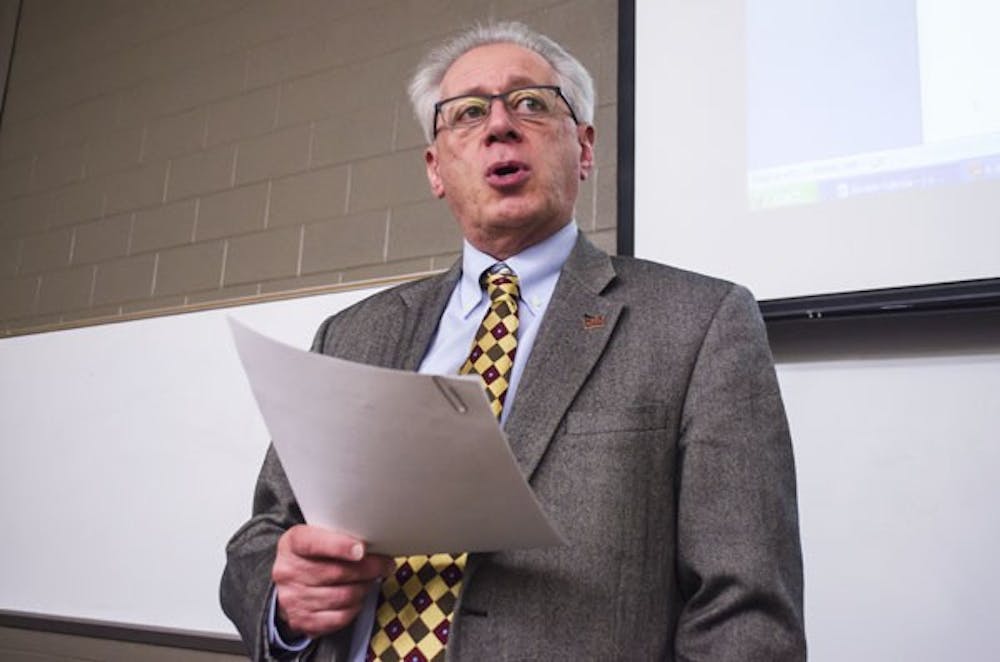Academic Senate postpones vote on academic calendar, while senators raise concerns

The Academic Senate Tuesday postponed voting on the proposed academic calendar change to Jan. 29.
The academic calendar was brought into consideration as a result of the new faculty contract bargaining agreement in 2011.
If the proposed calendar changes are adopted, Central Michigan University will begin classes after Labor Day. Other universities such as Western Michigan University and University of Michigan follow a similar calendar.
The primary concern among the senators was the amount of money the proposed academic calendar would cost.
"I can't understand how you can have two less weeks, and it costs us $3 million," Senator and Professor of Physics Joe Finck said during the meeting.
These estimated costs come from a report compiled by the Provost's office that detailed the costs the calendar change would have on affected departments.
"I'm not going to argue whether that information is correct or incorrect. That is the information that was provided to me," Provost Gary Shapiro said.
University President George Ross added to Shapiro's statement by saying the university spends, on average, a little over $1 million a day.
Some senators raised concerns over what kind of impact the calendar change would have on academics.
"The original calendar committee said nothing about academic gain," Shapiro said. "Of all the responses, there was one department that said it would have a positive impact."
Another concern that was brought up during the meeting was students having less time to complete projects.
Finck argued that students could work harder to make up for lost time.
"We will be asking our students to work 6.25 percent harder," Finck said. "There's a lot of room to ask our students to do more work."
Sen. Ken Jurkiewicz, associate professor of broadcast and cinematic arts, disagreed with Finck.
"For our production classes, a week is a week," Jurkiewicz said. "These kids need time, and we're taking away that time."
Student senator and former Student Government Association President Vincent Cavataio also disagreed with Finck.
"I don't have any more time as it is right now," the Shelby Township graduate student said.
Room and board rates
How to tackle room and board rates in the face of changes was a key concern among the A-Senate.
"If we were to reduce the room and board rates, that would result in a $2.5 million budget decrease," Shapiro said.
Shapiro said the university would save some money through utilities savings, but the university would still see a significant revenue loss.
"Residence and auxiliary halls will record a $3.3 million loss in revenue, with a cost savings of $700,000," Shapiro said. "That still results in a marginal loss of $2.5 million."
An alternative suggestion by Shapiro would be to not adjust the room and board rates. However, this suggestion might cause students and parents to question why the rates would stay the same despite living in the residence halls for less time.
Athletic concerns
Another concern with the proposed academic calendar changes are with football contracts that are in place through the 2016 season.
CMU has home football games scheduled for before Labor Day in 2014 and 2015 against North Carolina State and Oklahoma State, respectively. Canceling the contracts with both schools would cost the university $1 million.
CMU Athletics Director Dave Heeke previously told Central Michigan Life the games, if played, would have negative ramifications on attendance for the scheduled home-openers.
"You don't have to change those contracts," Shapiro said.
Ross said further football contracts are in negotiation through 2018.
Adjusting the current tuition rate was mentioned by some senators.
"I didn't include that (in the report) because I don't think that would happen," Shapiro said.
The A-Senate will vote on the implementation of the new academic calendar at its next formal meeting.
Staff reporter Jackson Seedott contributed to this report.



